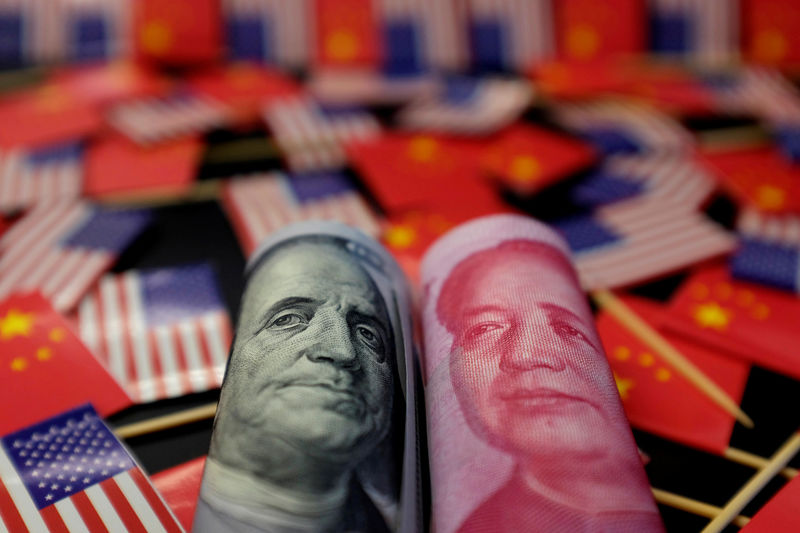By Yawen Chen and David Stanway
BEIJING/SHANGHAI (Reuters) - China's central bank said on Tuesday that Washington's decision to label Beijing as a currency manipulator would "severely damage international financial order and cause chaos in financial markets".
Washington's decision to ratchet up currency tensions on Monday would also "prevent a global economic and trade recovery," the People's Bank of China (PBOC) said in the country's first official response to the latest U.S. salvo in the two sides' rapidly escalating trade war.
China "has not used and will not use the exchange rate as a tool to deal with trade disputes," the PBOC said in a statement on its website.
"China advised the United States to rein in its horse before the precipice, and be aware of its errors, and turn back from the wrong path," it said.
The U.S. currency accusation, which followed a sharp slide in the yuan on Monday, has driven an even bigger wedge between the world's largest economies and crushed any lingering hopes for a quick resolution to their year-long trade war.
The dispute has already spread beyond tariffs to other areas such as technology, and analysts caution tit-for-tat measures could widen in scope and severity, weighing further on business confidence and global economic growth.
The U.S. Treasury Department said on Monday it had determined for the first time since 1994 that China was manipulating its currency, taking their trade dispute beyond tariffs.
The department referred to a PBOC statement on Monday as an open acknowledgement that it "has extensive experience manipulating its currency and remains prepared to do so on an ongoing basis."
'VENTING ANGER'
The U.S. decision was driven purely by political motive to "vent its anger", said Global Times, an influential Chinese tabloid published by the ruling Communist Party's People's Daily.
China "no longer expects goodwill from the United States", Hu Xijin, the newspaper's editor-in-chief, tweeted on Tuesday.
The U.S. decision to label China a manipulator came less than three weeks after the International Monetary Fund (IMF) said the yuan's value was in line with China's economic fundamentals, while the U.S. dollar was overvalued by 6% to 12%.
The U.S law sets out three criteria for identifying manipulation among major trading partners: a material global current account surplus, a significant trade surplus with the United States, and persistent one-way intervention in foreign exchange markets.
The PBOC said it does not fit the criteria for the label.
Zhang Anyuan, chief economist of stock brokerage China Securities, said it is "baseless for the U.S. side to determine that there was exchange rate manipulation based on the change in the exchange rate of the RMB (yuan) on a single day."
After the labeling, it's possible Washington "will introduce punishing measures that go beyond existing understanding of the situation," Zhang said.
CHINA'S RETALIATION OPTIONS
Chinese state media had warned that Beijing could use its dominant position as a rare earths exporter to the United States as leverage in the trade dispute. The materials are used in everything from military equipment to high-tech consumer electronics.
Shares in some of China's rare earth-related firms surged on Tuesday amid speculation the sector could be the next front in the trade war.
Beijing could also step up pressure on U.S. companies operating in China, analysts say.
Beijing in June issued a travel advisory warning Chinese tourists about the risks of traveling to the United States, citing concerns about gun violence, robberies and thefts.
Air China said on Tuesday that it was suspending its flights on the Beijing-Honolulu route starting on Aug. 27, following a review of its network.
In a further sign of deteriorating ties, China's commerce ministry announced overnight that its companies had stopped buying U.S. agricultural products in retaliation against Washington's latest tariff threat.
"In the end, the United States will eat the fruit of its own labor," the PBOC said.
FALLING YUAN
Chinese monetary authorities let the yuan fall past the closely watched 7 level on Monday so that markets could finally factor in concerns around the trade war and weakening economic growth, three people with knowledge of the discussions told Reuters on Monday.
The yuan has tumbled as much as 2.7% against the dollar over the past three days to 11-year lows after President Donald Trump's sudden declaration last week that he will impose 10% tariffs on $300 billion of Chinese imports from Sept. 1.
But it appeared to steady on Tuesday amid signs that China's central bank may be looking to stem the slide, which has sparked fears of a global currency war.[CNY/]
The offshore yuan fell to a record low of 7.1397 per dollar on Tuesday before clawing back losses after the central bank said it was selling yuan-denominated bills in Hong Kong, a move seen as curtailing short selling of the currency.
Onshore yuan also opened weaker before steadying, but remained below the 7 level. While the central bank set a slightly firmer-than-expected morning benchmark rate, it was still the weakest since May 2008.
The PBOC has insisted the value of its yuan is determined by the market, though it has maintained a firm grip on the currency and supported it when it neared sensitive levels over the past year.
U.S. Treasury Secretary Steven Mnuchin said the U.S. government will engage with the IMF to eliminate unfair competition from Beijing.
A IMF spokeswoman said the organization does not have any immediate comment.
After determining a country is a manipulator, the Treasury is required to demand special talks aimed at correcting an undervalued currency, with penalties such as exclusion from U.S. government procurement contracts.

"Naming China a currency manipulator could open the door for U.S. tariffs to eventually increase to more than 25% on Chinese goods," according to a note from DBS Group Research.